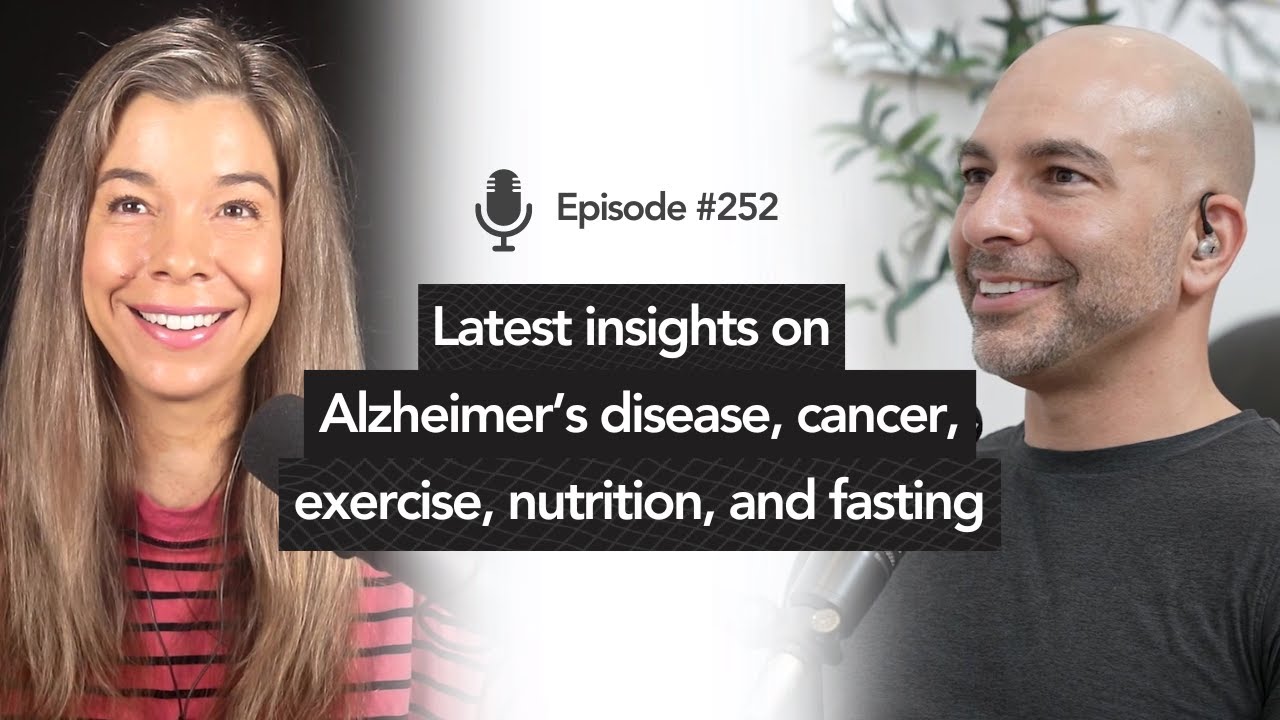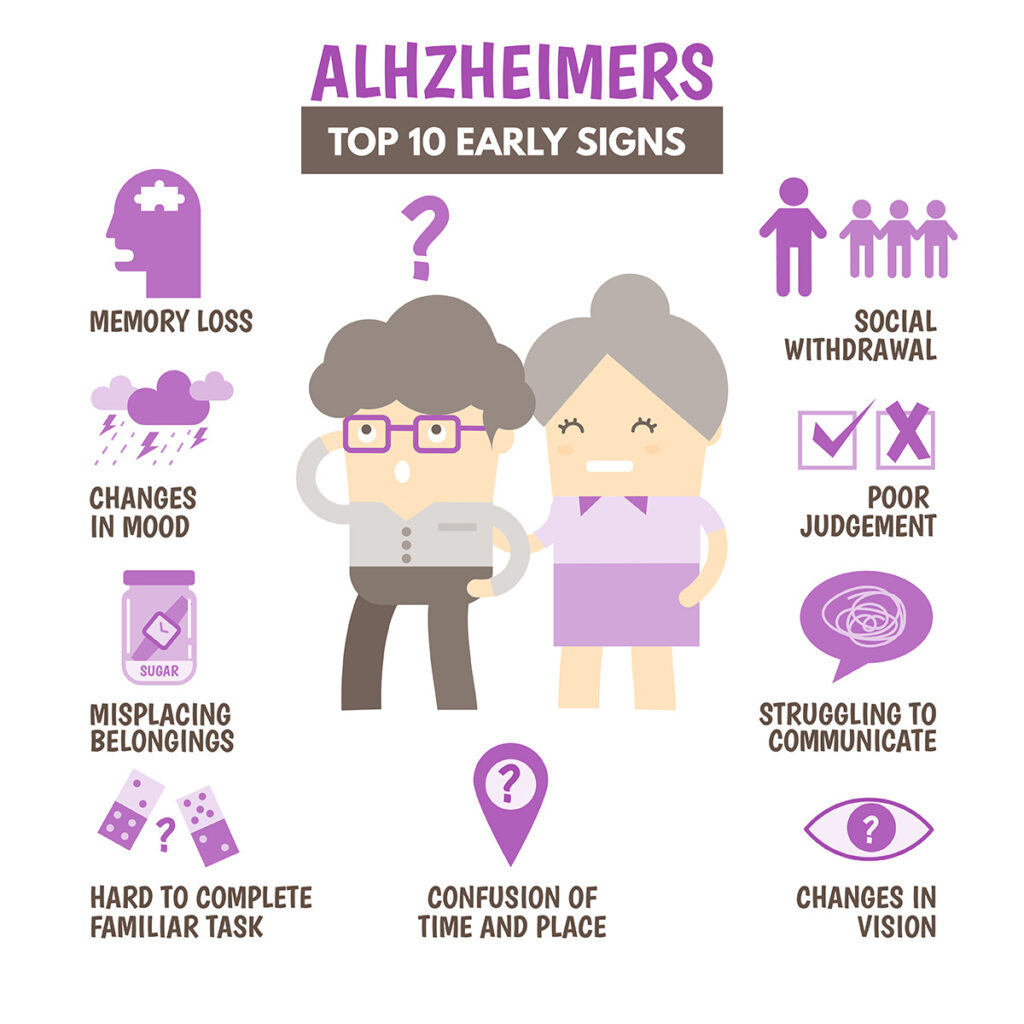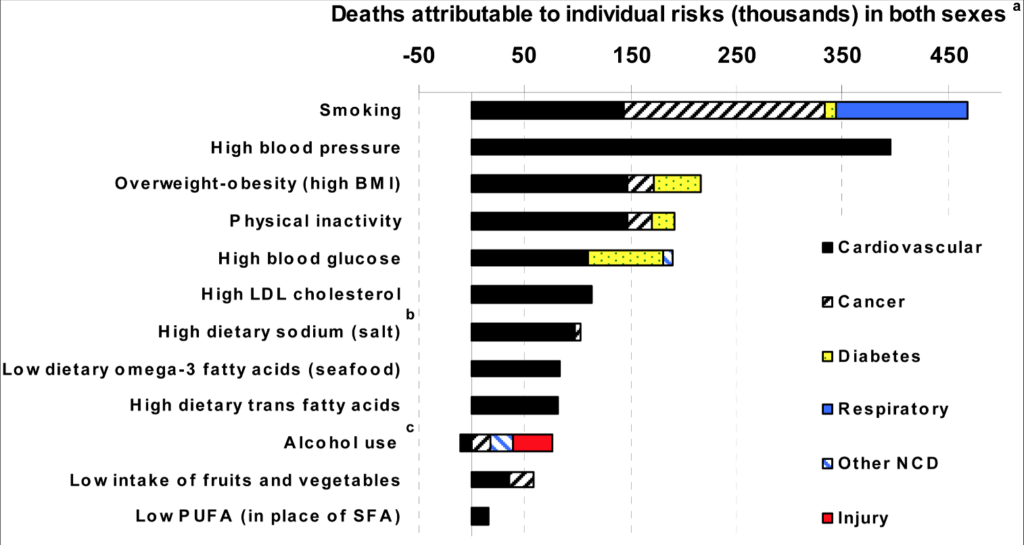- The latest research on Alzheimer’s disease, the different factors that affect it and ways to mitigate cognitive decline.
- The role of genetics, specifically the APOE-ε4 allele, in increasing susceptibility to Alzheimer’s disease.
- How lifestyle choices like diet, exercise, sleep, and alcohol consumption affect Alzheimer’s risk and overall health.
- The importance of adequate protein intake, especially in older adults, for preserving muscle mass, strength, and overall health.
- The role of physical activity and strength training in promoting cognitive function, muscle maintenance, and healthy ageing to reduce both cancer and Alzheimer’s risk.
- Insights into the ageing process, longevity, and effective strategies to maintain vitality and well-being as individuals age.
- The potential of omega-3 fatty acids (EPA and DHA) in preventing neurodegeneration.
Latest insights on Alzheimer’s disease, cancer, exercise, nutrition, and fasting
Latest insights on Alzheimer’s disease, cancer, exercise, nutrition, and fasting

- If you have a genetic susceptibility (such as one or two APOE-ε4 alleles) to Alzheimer's disease, consider decreasing or stopping alcohol consumption to reduce risks to brain health.
- Make sure you’re getting enough omega-3 fatty acids (especially DHA) to prevent neurodegeneration and decrease the risk of Alzheimer’s, particularly if you’re an APOE-ε4 carrier.
- Engaging in regular aerobic and strength training activities, ideally a minimum between 150-300 minutes of moderate-intensity (50-70% of max heart rate) or 75 minutes of high-intensity (75-85% of max heart rate) per week is the best way to ward off Alzheimer's.
- Incorporate between 1.6 and 2.2 grams of protein per kilo of body weight every day to support muscle health and avoid cognitive decline.
- Consume foods rich in essential amino acids like methionine (1 g per day), leucine and lysine (2-4 grams per serving), especially when doing high-intensity workouts, as they play a crucial role in muscle synthesis and growth.
- If practising intermittent fasting or time-restricted eating, be sure to eat protein-rich snacks (protein shakes, nuts, seeds, Greek yoghurt, jerky, etc.) outside your feeding window to ensure you're not compromising muscle health.
- Maintain a regular sleep schedule, minimising exposure to screens before bedtime and creating a comfortable sleep environment.
- Do heat sessions in a sauna and jacuzzi to increase the generation of brain-derived neurotrophic factor (BDNF), a protein responsible for learning and memory retention.
The Roots of Alzheimer’s
Alzheimer’s Disease is a complex landscape. Many are the pathologies characterising Alzheimer’s — from amyloid plaques, tau tangles, and glucose hypometabolism within the brain — and whilst research predominantly spotlights the amyloid hypothesis, there are still significant challenges in targeting this aspect as a definitive therapeutic route.
The early occurrence of blood vessel dysfunction and impairment of capillaries constituting the blood-brain barrier (BBB) — a commonality in several forms of dementia, Alzheimer’s, and type 2 diabetes — is another potential springboard for Alzheimer’s Disease. The integrity of the BBB is a fundamental determinant of brain health; its compromise, which can be caused by conditions like type 2 diabetes and elevated blood pressure, may lead to the infiltration of harmful substances into the brain, sparking neuroinflammation and disrupting the transport of essential nutrients.
Genetic factors are also substantial contributors to the susceptibility of Alzheimer’s Disease. This is particularly the case for people carrying the APOE-ε4 allele, and even more so if possessing two copies. On top of all the aforementioned, modifiable risk factors, such as lifestyle and environmental variables, also play a big role in the manifestation of late-onset Alzheimer’s.

Source: https://arizonaeldercare.com/early-onset-alzheimers/
The Potential of Diet for Mitigating Alzheimer’s Risk
Diet has a direct impact on brain health — therefore, it impacts Alzheimer’s. Among the most beneficial nutrients for neurodegeneration prevention are omega-3 fatty acids, particularly docosahexaenoic acid (DHA), which helps preserve BBB integrity and mitigate inflammatory processes. On that note, genetic research is looking at so-called precision nutrition; that is, how personalised dietary approaches might help manage genetic predispositions.
Indeed, prevention is crucial when thinking of Alzheimer’s, given that, once established, reversing its effects can be very challenging. As well as proper nutrition, managing risk factors is key for curbing Alzheimer’s disease incidence. This is especially the case when it comes to hypertension: research shows that maintaining optimal blood pressure is vital for safeguarding cerebral health and preventing dementia.

Source: https://journals.plos.org/plosmedicine/article?id=10.1371/journal.pmed.1000058
Exercise vs Alzheimer’s & Cancer
Lifestyle interventions are also at the forefront of the battle against Alzheimer’s. Here, exercise takes centre stage, with emphasis on intensity and frequency. Clocking 150-300 minutes of moderate-intensity or 75 minutes of vigorous-intensity exercise per week has notable neurobiological effects. Even more so in higher-intensity regimes, where the role of lactate in energy production and signalling pathways makes it a key contributor to improving brain health. Along those lines, the cardiovascular fitness developed through regular exercise can be a strong ally against Alzheimer’s Disease and cognitive decline, especially for mitigating risks.
“What can I do you know in my life to reduce my risk of getting cancer, my risk of dying from cancer, my risk of getting Alzheimer’s , my risk of getting dementia, of getting cardiovascular disease or type 2 diabetes? The only Panacea there is exercise.”
Rhonda Patrick
But the value of exercise goes beyond Alzheimer’s prevention. Studies have shown that regular exercise can reduce the risk of cancer, particularly breast and colorectal cancers, by up to 50%. One of the reasons for that is the myokines produced during aerobic exercise, which influence the growth of cancer cells. But exercise also reduces inflammation, improves insulin sensitivity, and promotes weight loss — all important factors in cancer risk reduction.
Speaking of cancer risk, alcohol consumption, even moderate drinking, has been shown to increase the probability of breast cancer. Some research has suggested that people with the APOE-ε4 allele might be more susceptible to alcohol’s deleterious effects, probably due to the impact alcohol has on sleep, which is a factor linked to Alzheimer’s and cardiovascular disease risk.
“I think poor sleep is causally driving Alzheimer’s risk and cardiovascular disease risk.”
Peter Attia
The Importance of Protein Intake
Together with strength training, adequate protein intake is of utmost importance for counteracting age-related reduction in muscle mass. Muscle mass, in turn, promotes functional independence, which can help mitigate the cognitive decline often associated with Alzheimer’s Disease. Nowadays, the recommended daily protein intake ranges between 1.6 to 2.2 grams per kilogram of body weight depending on the regularity and intensity of strength training.
That said, different protein sources have different amino acid content, which influences their effectiveness for muscle preservation. So whilst consuming the right amount of protein is crucial, so is tracking significant amino acids like methionine, leucine, and lysine. This need becomes even more important for those doing fasting and time-restricted eating, as these can result in protein deficiency. If that’s your case, consider incorporating protein-rich snacks outside your eating windows to avoid potential muscle loss.
So, yes, the landscape of Alzheimer’s is a complex one. But understanding your genetics, paying carful attention to nutrition, exploring lifestyle interventions, and exercising a lot can all help decrease the risk of this disease.



